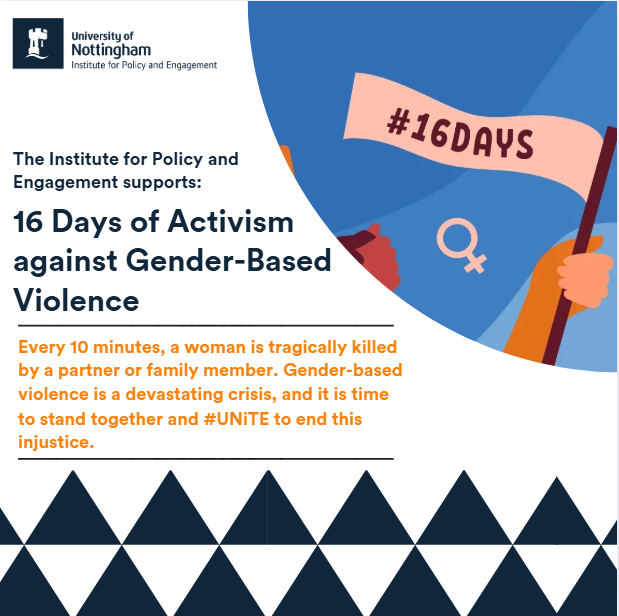What is the 16 Days of Activism campaign?
Why research on violence against women and girls is still crucial
Published 06 Dec 2024

The ongoing gender-based violence epidemic
On this, International Human Rights Day, we want to discuss the 16 days of activism against gender-based violence and why we still need to both raise awareness and research violence against women and girls. Over the last 16 days we have been sharing the crucial research our academics continue to do around sexual and gender-based violence (SGBV), from the survivors who have been disproportionately affected in Uganda by SGVB, hostile digital spaces for women and girls, to gaining justice for sex workers who experience violence and exploitation. This issue is of global importance, violence against women and girls (VAWG) continues to be a pervasive worldwide epidemic with 1 in 3 women having experienced physical and/or sexual violence at least once in their lifetime. Back in July, the UK declared violence against women and girls to be a national emergency having increased by 37% between 2018 – 2023 with over 3000 reported offences a day, and most offences go unreported.
Raising awareness in troubling times
Despite the ongoing increase, the evolving global climate is looking rather bleak for women and girls internationally, with the mandate for women’s health taking a blow in the recent US election. The need to be vocal, to call for action and to share the evidence and policy solutions is critical to reducing harm to women and girls everywhere. The 16 days of activism is an annual campaign (25th November to 10th December) to raise awareness of the impact of violence against women and girl on not only survivors but entire communities and to demand action and create a way forward to a world free from gender-based violence. The UK government has recognised the importance of this issue and the devastating impact it has, appointing the Minister for Safeguarding and VAWG, Jess Phillips, with the Home Secretary, Yvette Copper, to spearhead a cross-government set of measures to tackle violence against women and girls though results from this are yet to be seen.
Why is there still a need for research?
Having spent the early part of my career working for Juno Women’s Aid, a Nottingham-based charity who support women and children experiencing domestic abuse, I have seen first hand the crisis that faces survivors and communities as a result of gender-based violence. Whilst campaigns such as the #MeToo movement and the Angiolini Inquiry, established in response to the murder of Sarah Everard, has helped to raise public awareness of the struggle women and girls face, there is still much more to be done. Universities have a big role to play in this, not just through their local, national and international research on gender-based violence, but as conveners of people, as advocates for social justice and pillars of progressive, innovative thought. The impact of gender-based violence can be felt in every country, community and organisation across the world, and as universities we are in the unique position to be able to highlight the evidence and impact of this harm in every sector as well as the disproportionate and intersectional way that it is experienced. Our research is developed in collaboration with the survivors and communities and gives a platform to survivors, allowing their voices to reach the people with the power to change this discourse and the lived experience of women and girls everywhere. It is critical that we continue this vital work and find new way to collaborate and codevelop strategies and pathways to a world free from fear, where gender-based violence is no longer a global epidemic and the rights of women and girls to live full lives free from violence is not just respected but expected.
In times like these it is more important than ever for institutions and research to amplify the voice of survivors and continue to push for for a way forward that allows women and girls globally to live free from gender-based violence.
Thanks for reading this article from Tiffany. If you would like to know more about what we do, shoot us an email on theinstitute@nottingham.ac.uk